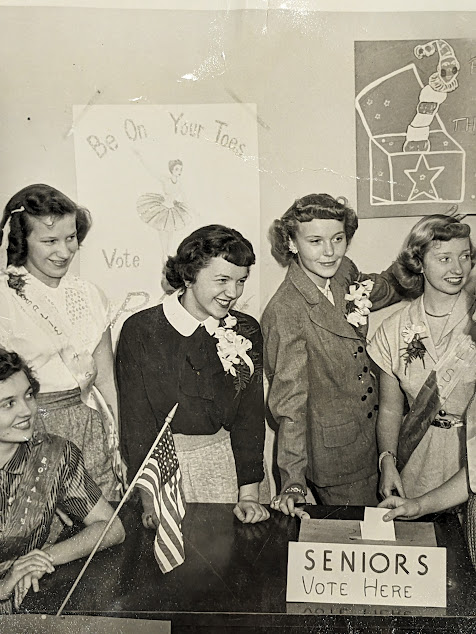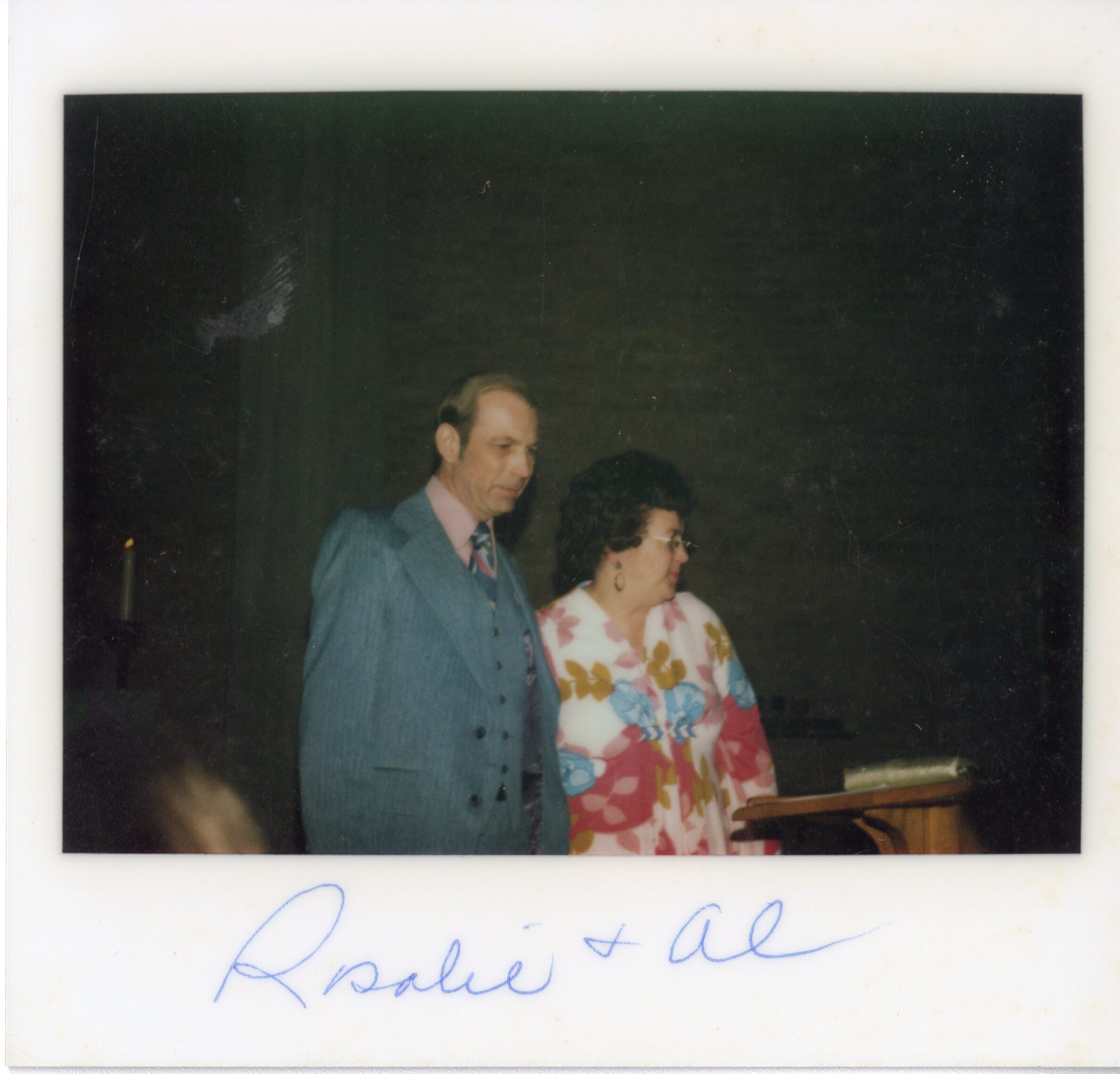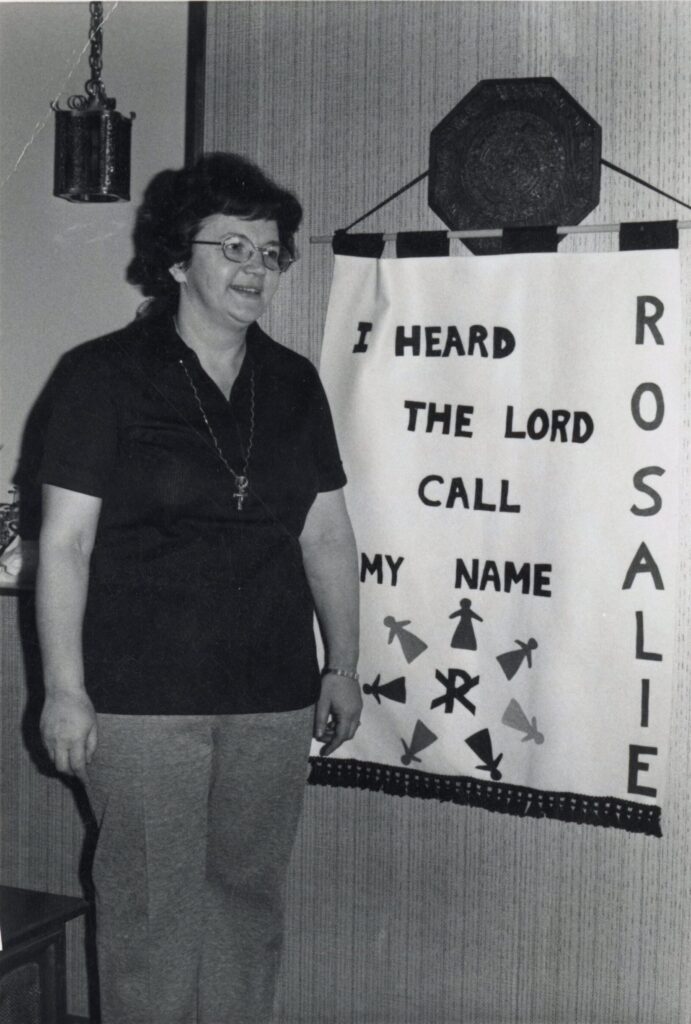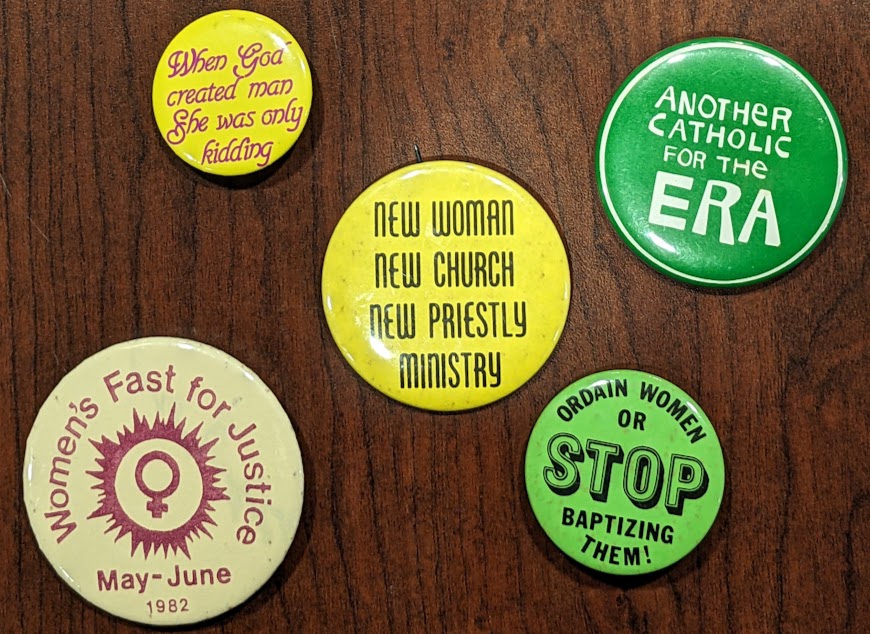“My name is Woman. So that you can know me from other women, I am called Rosalie Muschal-Reinhardt”1.
My Name is Woman, Personal Reflections
If you explore the Women and Leadership Archives and come across the finding aid for the Rosalie Muschal-Reinhardt Papers you will discover boxes of materials, including Box 1 Folder 9 Personal Reflections. Leafing through this folder you will the find reflections of teacher, mother, wife, activist, and religious leader Rosalie Muschal-Reinhardt, who dedicated her life towards, “the elimination of Sexism, Racism, Classism, Heterosexism and Ageism in our society”2. Born on June 23rd, 1933, Rosalie knew as a teenager that she wanted to be a teacher, a wife, and a mother. She achieved all of these goals and more.

In 1954, Rosalie earned her Bachelor of Science degree in Business Education from Rider University. She achieved her first goal through becoming a business teacher, and teaching Confraternity of Christian Doctrine classes, providing lessons on Catholicism to youth not attending Catholic school. In July of 1955 Rosalie married Alfred “Al” Reinhardt, writing that she fell in love with a man who was, “gentle, sensitive, and treated me with dignity”. Later, Rosalie was able to fulfill her final dream of being a mother, becoming pregnant with her first-born son Alfred. Overjoyed, Rosalie writes that she, “felt so connected with life, with God, with Al, with the universe”3 . She felt that her and Al were co-creating with God, bringing new life into the world. While the birth of Alfred brought Rosalie so much happiness, it also caused one of her first moments of dispute with the Catholic Church. Rosalie went to her local parish to arrange Alfred’s baptism, a sacrament of initiation into the Catholic Church. There she was told by a priest that she had to be churched. This was a practice in Catholicism to purify women postpartum, to give thanks for the safe delivery of her child, and was officially dropped in the 1960s after the Second Vatican Council. Rosalie was shocked and firmly told her priest no, “I was co-creating with God…I would not submit myself to something (that I was dirty) that was not true”4 . Rosalie would give birth to three more children, Erika, Kurt, and Michael. At the age of thirty she found that she had become everything she wanted to be. Yet, she yearned for more.

Vatican II, a council of the Catholic Church which lasted for four sessions from 1962 through 1965, brought many changes in the Church. With these changes came questions, and Rosalie joined a discussion group with women in the parish, seeking to find answers to the questions her fellow parishioners were asking her as they looked to her for guidance. Through this group she felt that Vatican II allowed her to be a greater part of the Catholic Church. Vatican II encouraged laity to become more involved in the Church, and this, combined with a lack of professionalism she saw in religious education, encouraged her to seek a Master of Arts in Religious Education from Colgate Rochester Divinity School. She completed the requirements for this Masters in 1969, and in 1977 she completed a Master of Divinity degree from Loyola University Chicago through the Jesuit School of Theology. In her education she studied evidence of God’s love but also the painful patriarchal legacy of the church. Reading the Church Fathers, she discovered them describing women as, “the devil’s gateway”, “the top of a sewer”, and “a misbegotten male”5. These misogynistic descriptors went against Rosalie’s understandings of Jesus, that he had come for all people, and she writes that because, “of my understandings of the gospel of Jesus Christ, I became a feminist”6 . Through her understandings of Catholicism and her work with the Church, Rosalie described in her reflections how she felt called to the priesthood.

This sensation of being called to the priesthood was ignited when Rosalie was described as a priest by a member of her local chapter of St. Joan’s International Alliance, where she found women and men who believed that women and men are equal before God and in the Church. Rosalie was shocked, writing, “I could not believe that I, a very ordinary woman, a happily-married woman, mother of four children, an earthy woman, a woman who really grooved on living, could be a priest”7. A fellow member Mary told Rosalie that she guided the group and shared with them, bringing them closer to God, just as a priest would. This moment sparked years of reflection and discernment for Rosalie. In her reflection “My Name is Woman”, she writes that she felt called to the priesthood and already did most of what a priest does; teach, worship, preside at celebrations, listen, counsel, and be involved in social ministries, healing the hungry, sick, and oppressed. In this reflection she admonishes the Catholic Church, detailing four specific admonitions to the institutional Church. First, ordain women or stop baptizing them. Second, no mini-ministries, allow women to be fully involved in the Church. Third, equal rites for women, allow women to be fully involved in the Church by becoming priests, if they desire. And her fourth admonition: end male colonialism, imperialism, and sex-based apartheid8.
Through Rosalie’s activism and leadership, she not only worked toward women’s ordination but was involved in multiple organizations, working to eliminate sexism, racism, classism, heterosexism, and ageism. In 1978 she co-founded the Women’s Ordination Conference, with the goal to achieve the ordination of women as priests in the Roman Catholic Church. In 1988 she co-founded Mary’s Pence, which collected and donated funds for women’s ministries. In the early 1990s she became a co-coordinator with three other women of Prism Collective. Prism Collective worked to foster feminist scholarship for adolescent women and publish books on women-affirming spirituality. She was a member of QuEST, Quixote Education Strategy Team, which worked to provide an education strategy for the Roman Catholic Diocese of Rochester, New York on the issues of homosexuality. She was a Member of the Board of Fortunate Families, a ministry with Catholic parents with lesbian daughters and gay sons. Additionally, she was on the planning committee for the fifth annual conference of NACDLGMO, the National Association of Catholic Diocesan Lesbian and Gay Ministries, which was held in 1998 in Rochester, New York. NACDLGMO was founded in 1994 to be a national resource as well as advocate and facilitate pastoral care for Catholic lesbian and gay persons and their families. In 2001 she became certified as a Sage-ing Leader with the Spiritual Eldering Program. As a Sage-ing Leader she was able to fulfill her passion of eliminating ageism and participated in several conferences, meetings, and workshops to address care of elderly, support for elder care givers, and elder care education.
Rosalie passed away on October 6th, 2013, at eighty years old. Her life was imbued with love and a passion to better the lives of others. While activists today are still working to create the change Rosalie wished to see in the world, her life is an example of the importance of hope, that the work we do is often not for us but for those who come after us, and that working towards what you believe in is never meaningless.
[1] “My Name is Woman”, undated. Box 1 Folder 9 Personal Reflections.
[2] Box 1 Folder 10 Resume & CV, 1998, undated “Rosalie Muschal-Reinhardt” 2004 Resume.doc
[3] “What Do You Want To Be When You Grow Up?”, undated. Box 1 Folder 9 Personal Reflections.
[4] “What Do You Want To Be When You Grow Up?”, undated. Box 1 Folder 9 Personal Reflections.
[5] “My Name is Woman”, undated. Box 1 Folder 9 Personal Reflections.
[6] “What Do You Want To Be When You Grow Up?”, undated. Box 1 Folder 9 Personal Reflections.
[7] “My Name is Woman”, undated. Box 1 Folder 9 Personal Reflections.
[8] “My Name is Woman”, undated. Box 1 Folder 9 Personal Reflections.
Max is a graduate assistant at the Women and Leadership Archives and a student in the History Master’s program at Loyola.
Loyola University Chicago’s Women and Leadership Archives Blog is designed to provide a positive environment for the Loyola community to discuss important issues and ideas. Questions? Contact wlarchives@luc.edu.

